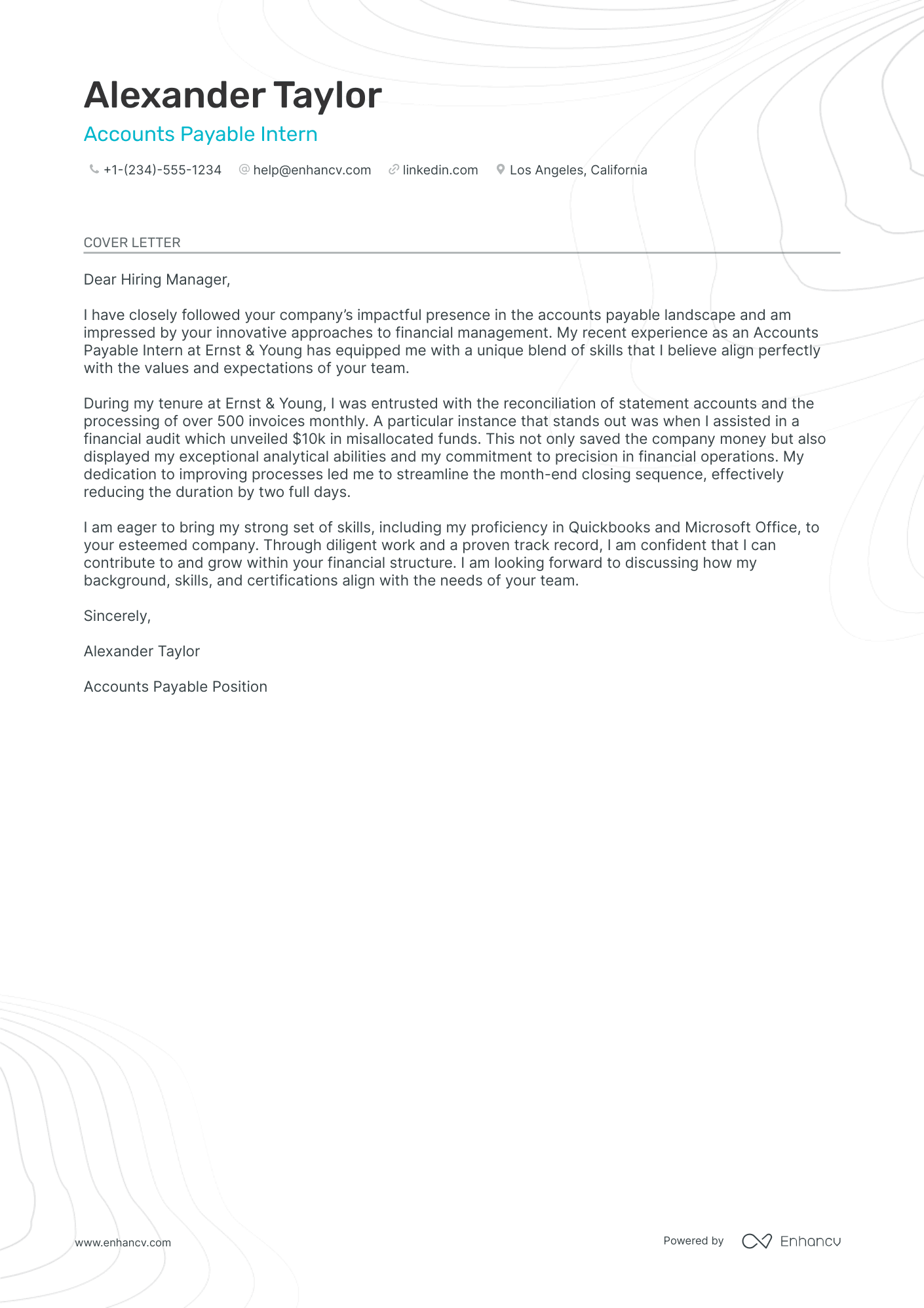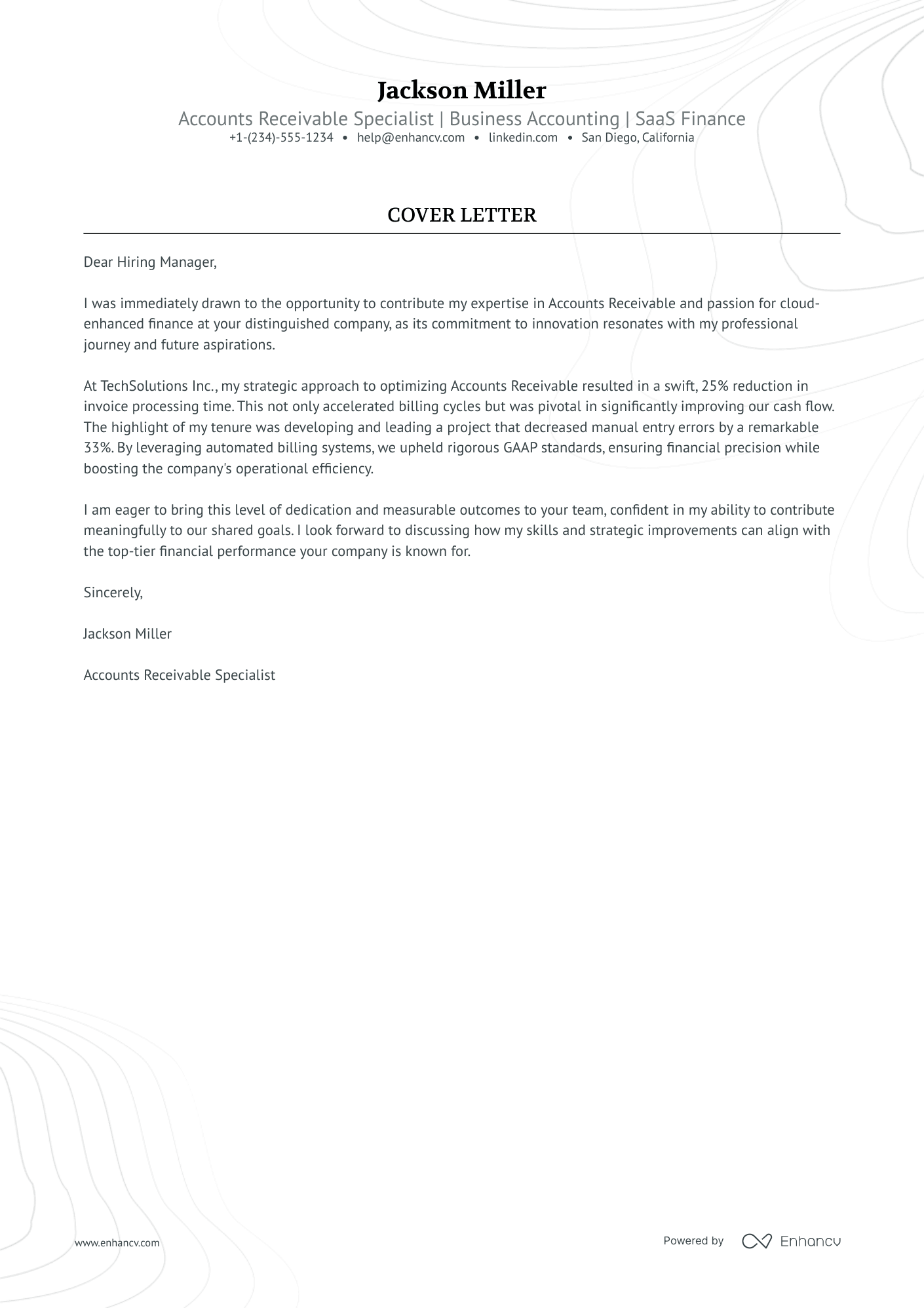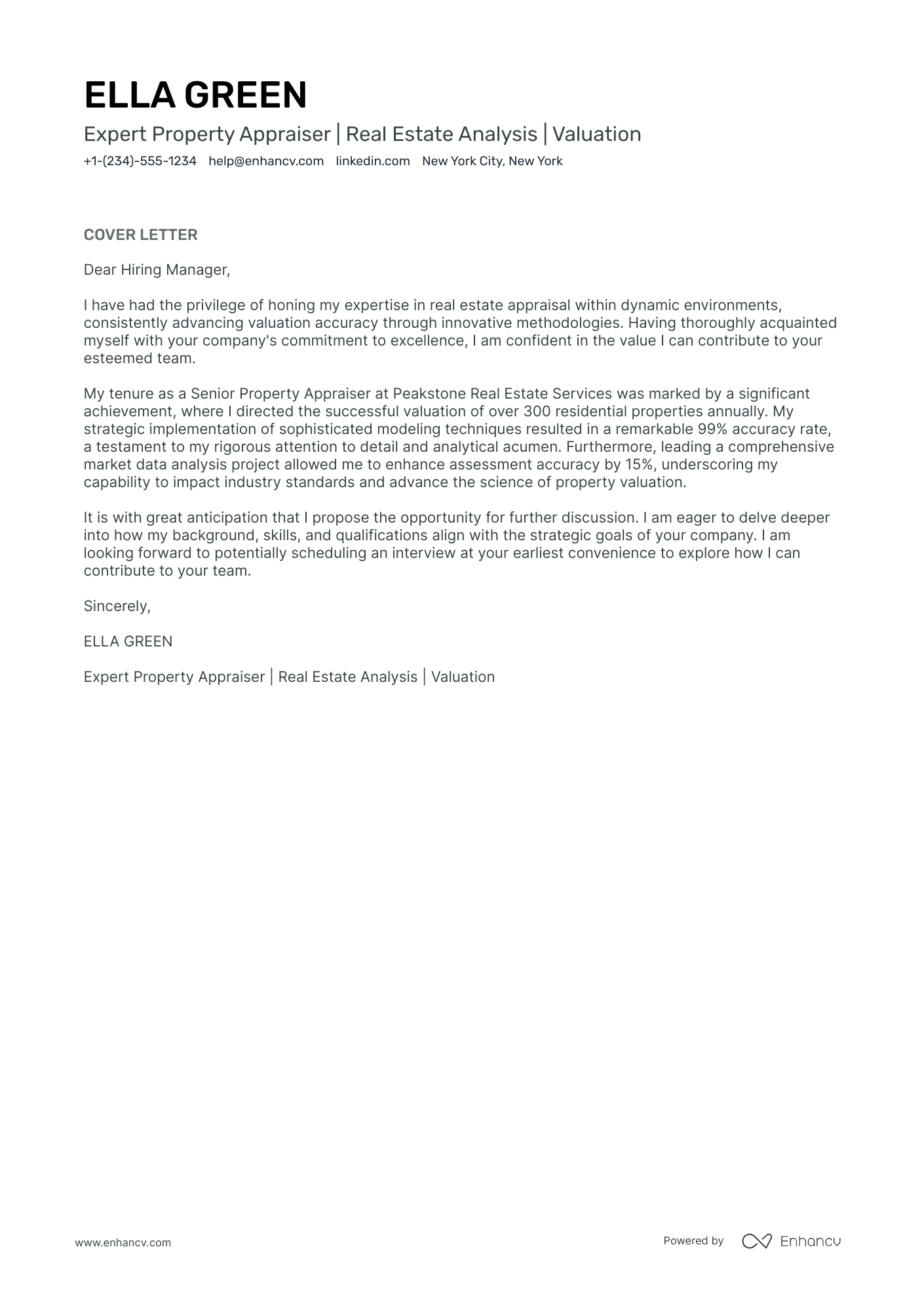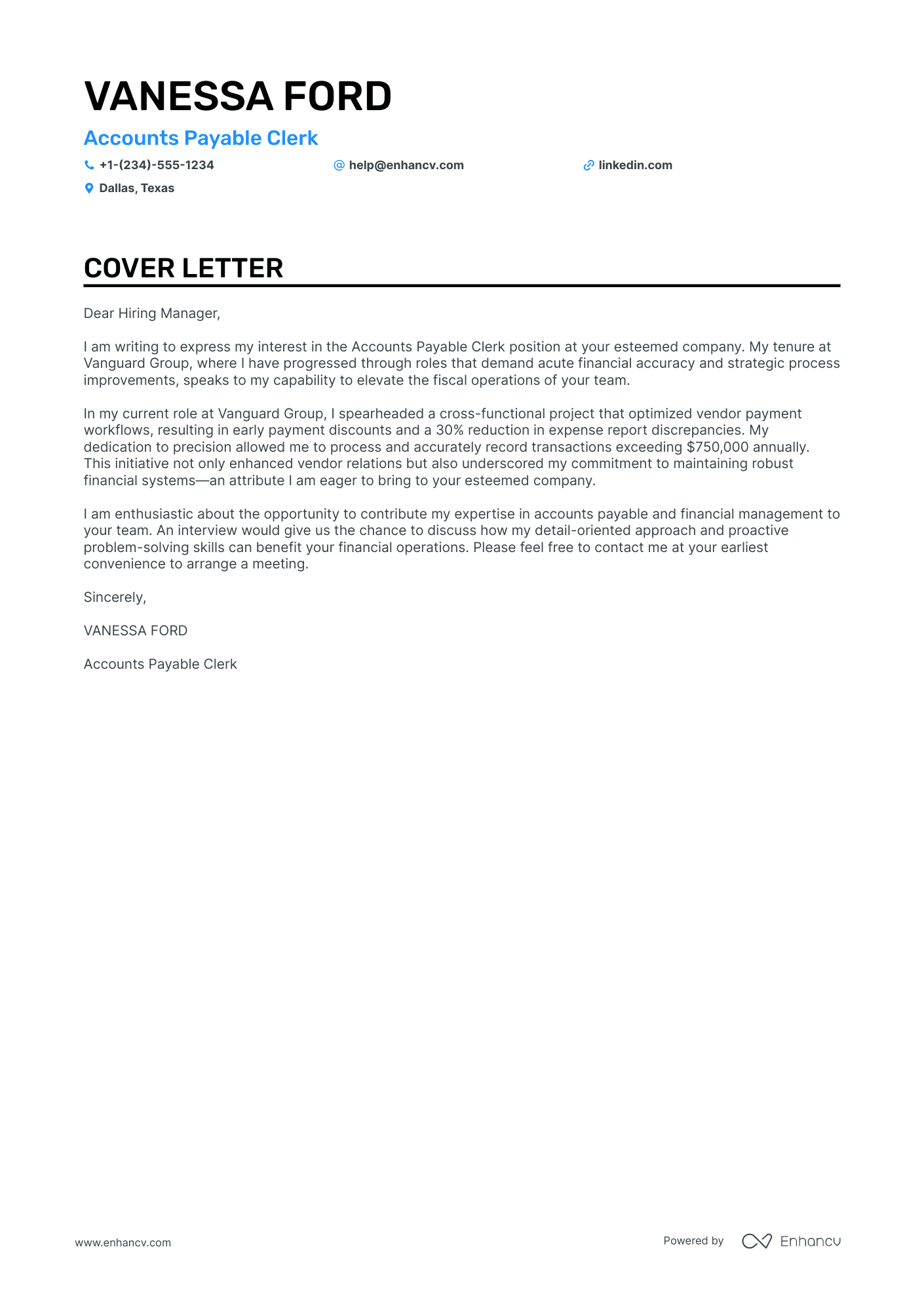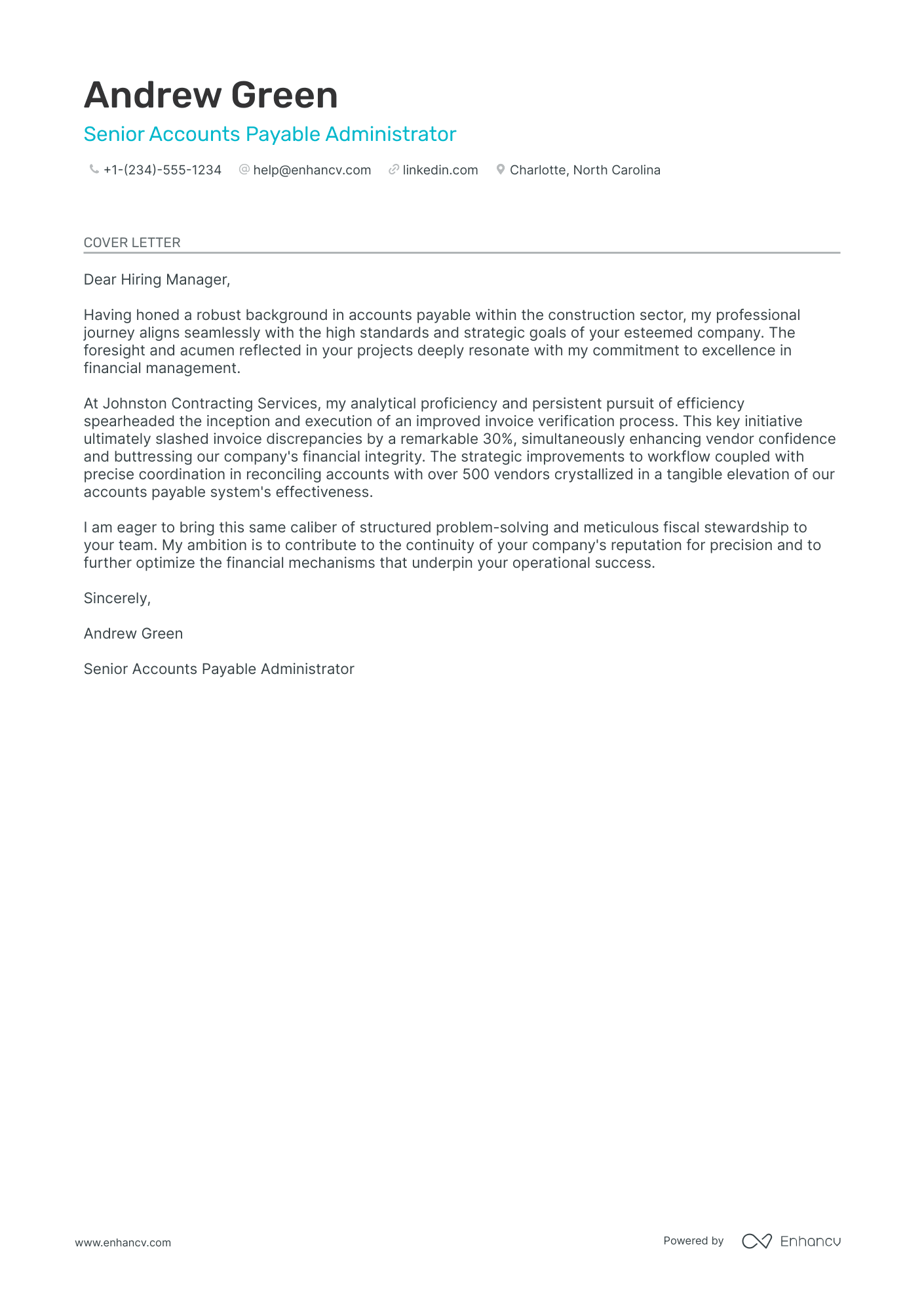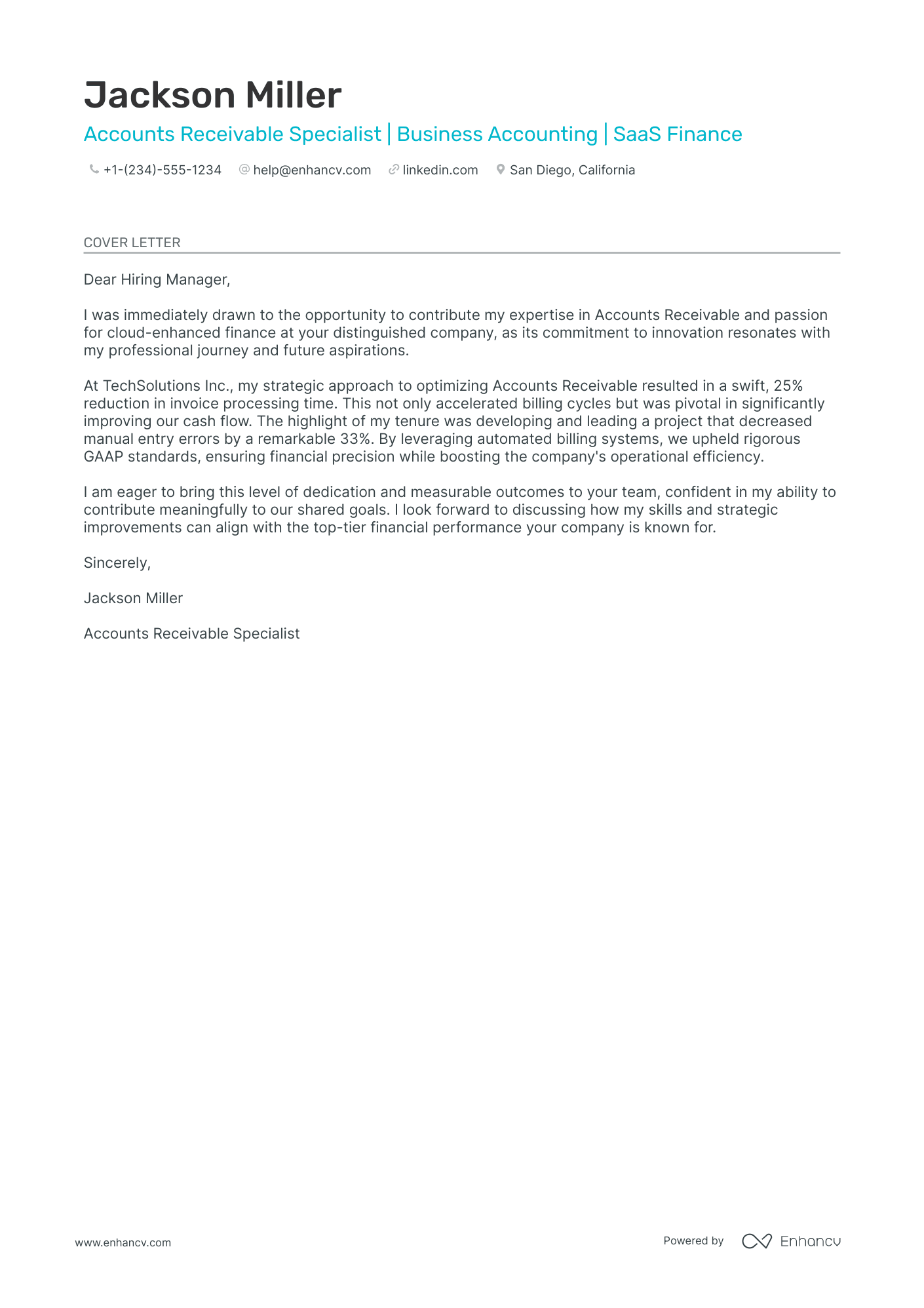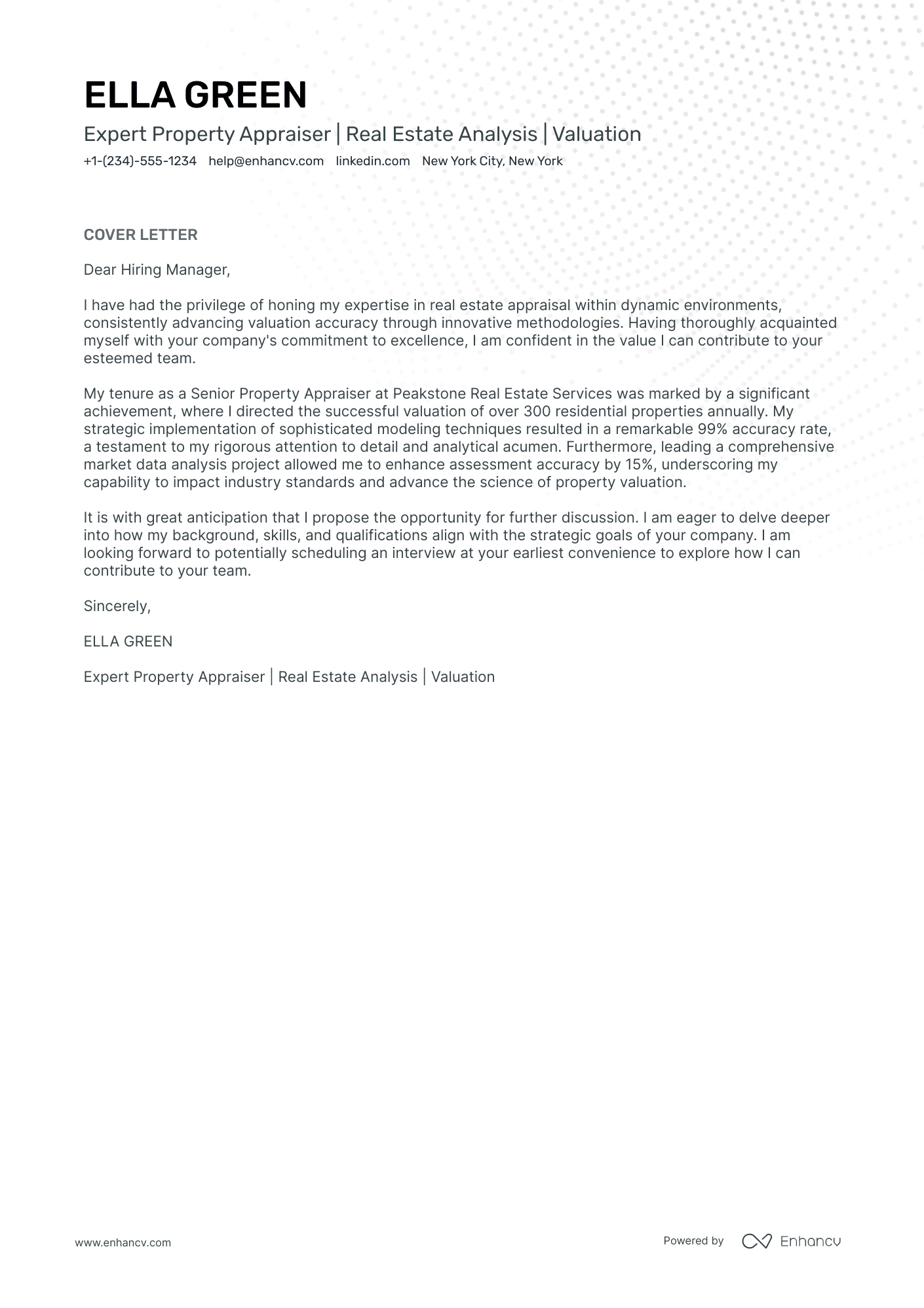Embarking on your job search, you've diligently sent out resumes, only to realize that a compelling accounts payable cover letter is also in demand. Standing out without echoing your resume calls for showcasing a prized professional victory, wrapping your experience in a captivating narrative. Embrace formality, dodge cliches and keep it concise – your cover letter's story, limited to one page, could be the ticket to your next career milestone. Let's navigate this challenge together.
- Writing the essential accounts payable cover letter sections: balancing your professionalism and personality;
- Mixing storytelling, your unique skill set, and your greatest achievement;
- Providing relevant (and interesting) information with your accounts payable cover letter, despite your lack of professional experience;
- Finding the perfect format for your[ accounts payable cover letter, using templates from industry experts.
Leverage the power of Enhancv's AI: upload your resume and our platform will map out how your accounts payable cover letter should look, in mere moments.
If the accounts payable isn't exactly the one you're looking for we have a plethora of cover letter examples for jobs like this one:
- Accounts Payable resume guide and example
- Finance Manager cover letter example
- Financial Project Manager cover letter example
- Investment Banking Associate cover letter example
- Credit Manager cover letter example
- Treasury Manager cover letter example
- Phone Banking cover letter example
- Bank Teller cover letter example
- Accounting Assistant cover letter example
- Portfolio Manager cover letter example
- Tax Director cover letter example
Drop your resume here or choose a file.
PDF & DOCX only. Max 2MB file size.
Accounts payable cover letter example
TAYLOR FOSTER
Fort Worth, TX
+1-(234)-555-1234
help@enhancv.com
The visual appeal of your accounts payable cover letter: format, font, and structure
When using our cover letter builder, make sure to include these vital sections:
- Header (with your name, contact details, the role, and date);
- Greeting (that's personalized to the recruiter);
- Introductory paragraph (to capture attention);
- Body paragraph (to tell a story of how you've obtained your job-crucial skills);
- Closing paragraph (ending with a nod to the future ahead);
- Signature (that is not a must).
Our cover letter templates are already set up for you with the best accounts payable cover letter design with single-spaced paragraphs and a one-inch margin.
As for the font of your accounts payable cover letter, use the same one as you did in your resume (where modern and simple fonts, like Rubik and Bitter, take precedence over Arial and Times New Roman).
Your accounts payable cover letter is created with the recruiters in mind - as no Applicant Tracker System looks over this part of your profile.
When sending over your accounts payable cover letter, download it in PDF. This format allows your information and design to stay intact and to keep the same visual quality.
Tight on time? Our free cover letter generator helps you create a cover letter instantly from your resume.
The top sections on a accounts payable cover letter
- Header: The header includes your contact information and the date, which is essential for the recruiter to know who you are and how they can reach you.
- Greeting: A professional greeting shows respect and personalization, addressing the recruiter or hiring manager by name if possible, which demonstrates attention to detail.
- Introduction: The introduction should succinctly state your interest in the accounts payable position and mention how you learned about the job opening, showing your genuine enthusiasm and immediate relevance.
- Body: In the body, highlight your relevant accounts payable experience, proficiency with accounting software, attention to detail, and any achievements related to managing finances or vendor relations, directly aligning your skills with the job requirements.
- Closing: Your closing should reiterate your interest in the role, invite further discussion, and thank the recruiter for considering your application, leaving a professional and courteous final impression.
Key qualities recruiters search for in a candidate’s cover letter
- Attention to detail: Critical for accurately processing invoices, maintaining records, and ensuring compliance with financial policies.
- Proficiency in accounting software: Essential for efficiently managing and tracking payments, as well as facilitating digital transactions.
- Strong organizational skills: Important for managing multiple accounts, adhering to payment schedules, and maintaining orderly financial records.
- Excellent communication skills: Necessary for effectively interacting with vendors, resolving disputes, and collaborating with the finance team.
- Problem-solving abilities: Required to address discrepancies in billing, negotiate payment terms, and handle any issues that arise with invoice processing.
- Experience with financial reconciliation: Vital for ensuring that payments are correctly recorded and that accounts reconcile with bank statements and ledger entries.
Greeting recruiters with your accounts payable cover letter salutation
What better way to start your conversation with the hiring manager, than by greeting them?
Take the time to find out who the professional, recruiting for the role, is.
Search on LinkedIn, the company website. And for those still keen on making a fantastic first impression, you could even contact the organization, asking for the recruiter's name and more details about the job.
Address recruiters in the accounts payable greeting by either their first name or last name. (e.g. "Dear Anthony" or "Dear Ms. Smarts").
If you're unable to discover the recruiter's name - don't go for the impersonal "To whom it may concern", but instead use "Dear HR team".
List of salutations you can use
- Dear Hiring Manager,
- Dear [Company Name] Team,
- Dear [Department Name] Hiring Committee,
- Dear [Mr./Ms./Dr.] [Last Name],
- Dear [Full Name],
- Dear [Job Title] Search Committee,
Your accounts payable cover letter intro: showing your interest in the role
On to the actual content of your accounts payable cover letter and the introductory paragraph.
The intro should be no more than two sentences long and presents you in the best light possible.
Use your accounts payable cover letter introduction to prove exactly what interests you in the role or organization. Is it the:
- Company culture;
- Growth opportunities;
- Projects and awards the team worked on/won in the past year;
- Specific technologies the department uses.
When writing your accounts payable cover letter intro, be precise and sound enthusiastic about the role.
Your introduction should hint to recruiters that you're excited about the opportunity and that you possess an array of soft skills, e.g. motivation, determination, work ethic, etc.
Choosing your best achievement for the middle or body of your accounts payable cover letter
Now that you have the recruiters' attention, it's time to write the chunkiest bit of your accounts payable cover letter.
The body consists of three to six paragraphs that focus on one of your achievements.
Use your past success to tell a story of how you obtained your most job-crucial skills and know-how (make sure to back these up with tangible metrics).
Another excellent idea for your accounts payable cover letter's middle paragraphs is to shine a light on your unique professional value.
Write consistently and make sure to present information that is relevant to the role.
Final words: writing your accounts payable cover letter closing paragraph
The final paragraph of your accounts payable cover letter allows you that one final chance to make a great first impression.
Instead of going straight to the "sincerely yours" ending, you can back up your skills with a promise of:
- how you see yourself growing into the role;
- the unique skills you'd bring to the organization.
Whatever you choose, always be specific (and remember to uphold your promise, once you land the role).
If this option doesn't seem that appealing to you, close off your accounts payable cover letter with a follow-up request.
You could even provide your availability for interviews so that the recruiters would be able to easily arrange your first meeting.
No experience accounts payable cover letter: making the most out of your profile
Candidates who happen to have no professional experience use their accounts payable cover letter to stand out.
Instead of focusing on a professional achievement, aim to quantify all the relevant, transferrable skills from your life experience.
Once again, the best practice to do so would be to select an accomplishment - from your whole career history.
Another option would be to plan out your career goals and objectives: how do you see yourself growing, as a professional, in the next five years, thanks to this opportunity?
Be precise and concise about your dreams, and align them with the company vision.
Key takeaways
We hope this accounts payable cover letter writing guide has shown you how to:
- Format your accounts payable cover letter with the mandatory sections (e.g. header, greeting, intro, body, and closing) and select the right font (P.S. It should be the same as the one you've used for your resume);
- Substitute your lack of professional experience with your most noteworthy achievement, outside of work, or your dreams and passions;
- Ensure recruiters have a more personalized experience by tailoring your cover letter not just to the role, but to them (e.g. writing their first/last name in the salutation, etc.);
- Introducing your biggest achievement and the skills it has taught you in your accounts payable cover letter body;
- Write no more than two sentences in your accounts payable cover letter introduction to set the right tone from the get-go.
Accounts Payable cover letter examples
By Experience
Entry-Level Accounts Payable
By Role
